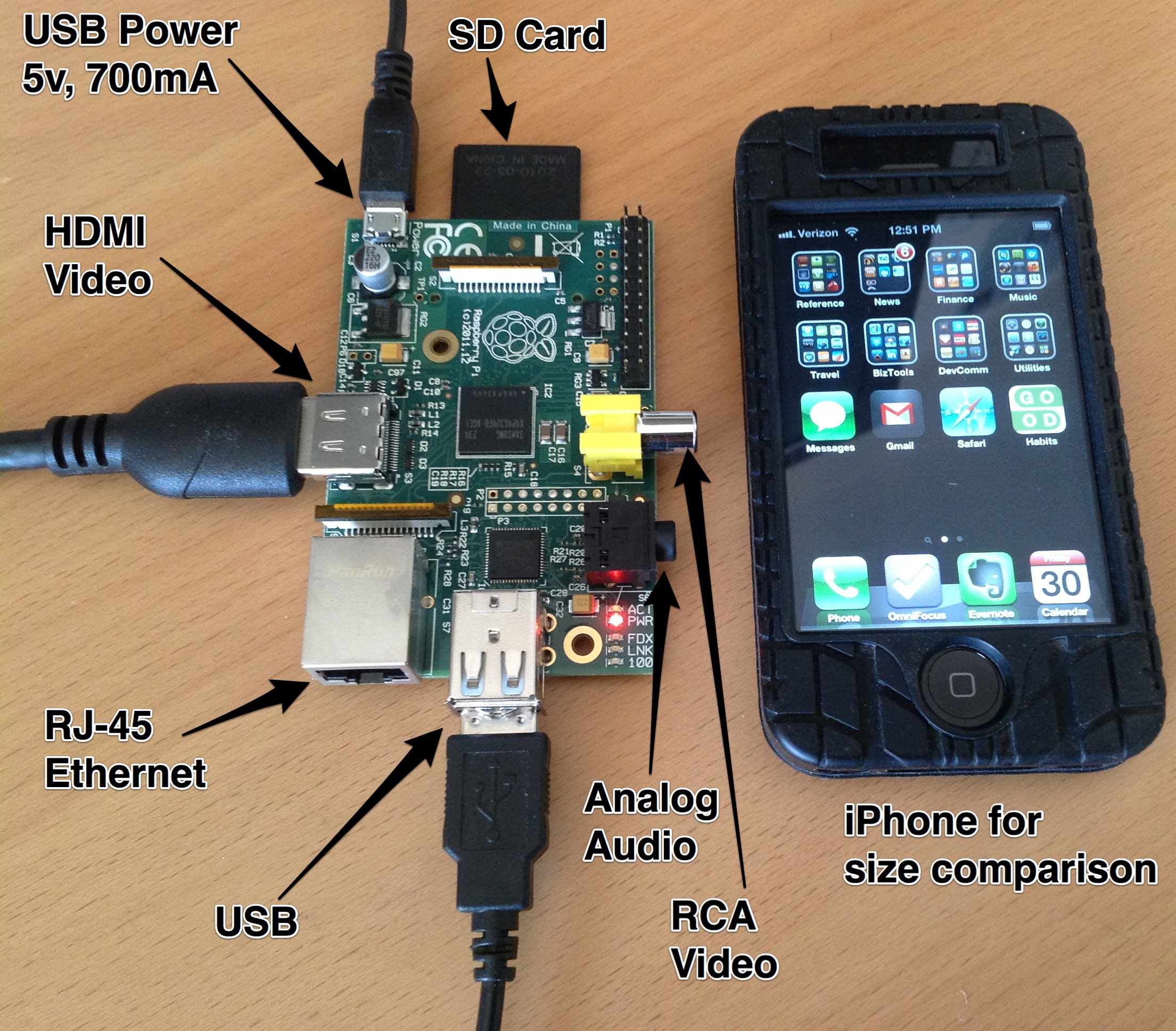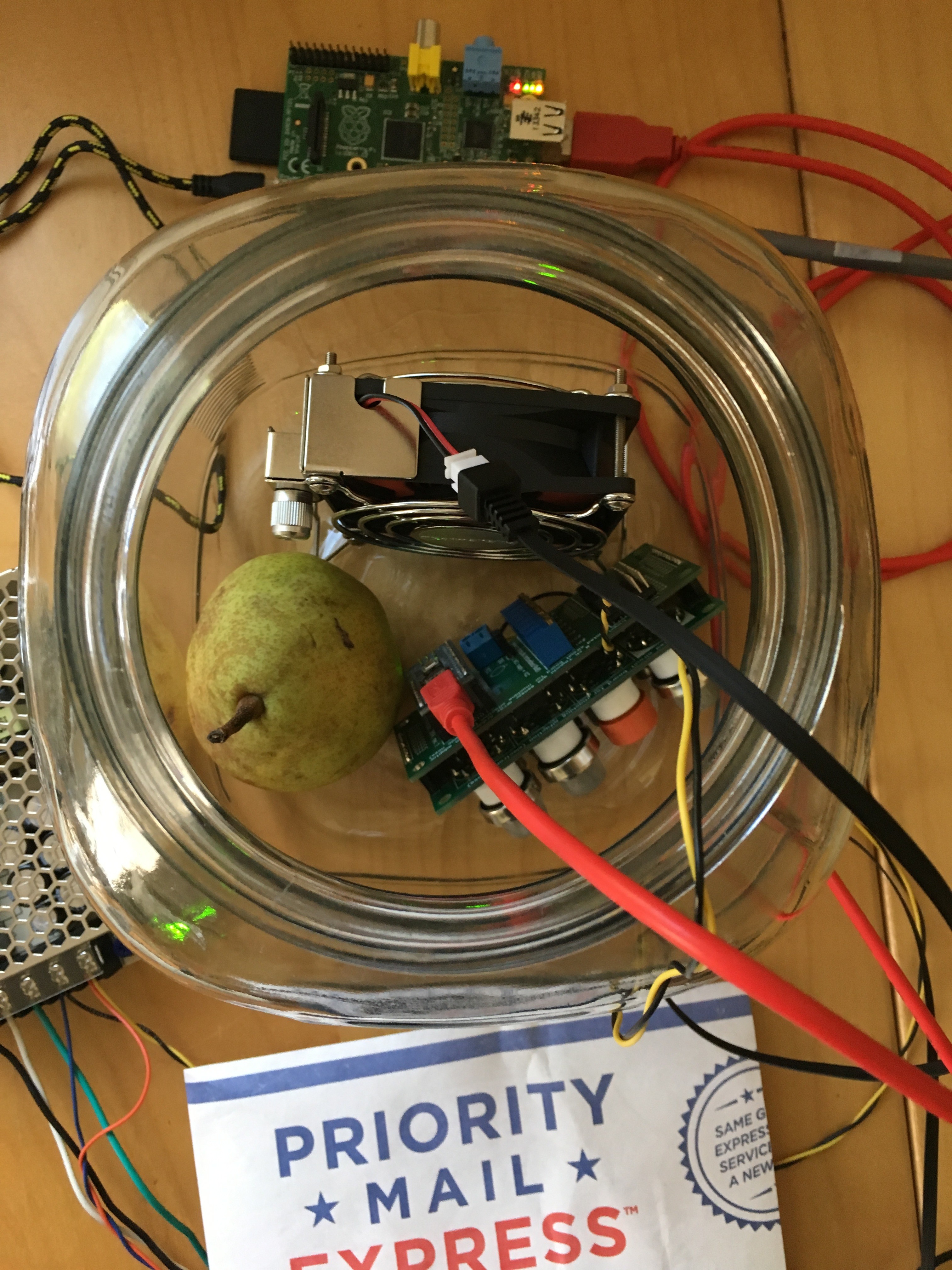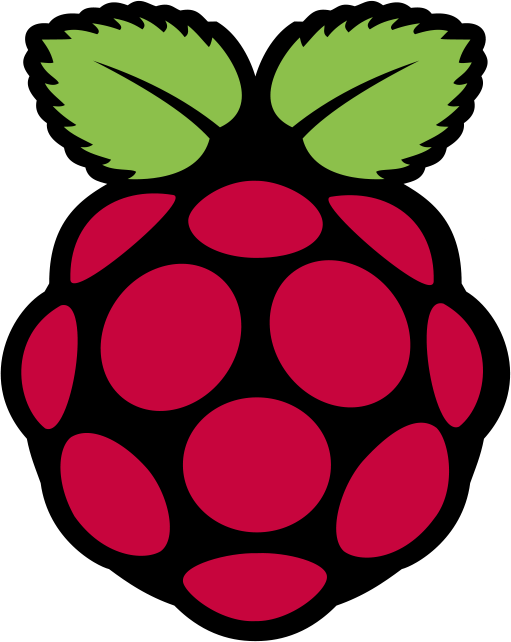THE EVOLUTION OF RASPBERRY PI - meylon1/Raspberrypi GitHub Wiki
Welcome to the Raspberrypi wiki!
Raspberry Pi is a low cost credit card sized computer that can be used for various tasks and projects, many that a full sized computer can be used for. This paper presents the history of the Raspberry Pi including the original concept and reasons why it was created, the past and present versions of the Raspberry Pi and it's technical specifications, some of the current and popular uses for the Raspberry Pi, and the possible future uses of the technology.
Since the dawn of technology, it seems that computers have evolved and are constantly changing. Within that evolution, new and improved technologies keep erupting to lead the market of cutting-edge computers, mobile phones, and many other devices. The industry is becoming so vast, that the possibilities seem to be limitless now. Continuing through this article, one will discover a new device on the market that is taking the industry by surprise from the specifications that this small, compact box has to offer.
In the beginning of Raspberry Pi, it was comprised of a group of trustees and the project co-founders and innovators Eben Upton, Rob Mullins, Jack Lang and Alan Mycroft. In 2006, this group was deeply concerned with the decline of computer science applicants and students, so, this group of individuals got the idea to build an efficient, but affordable, tiny computer to help students continue to pursue further into the IT academics. A few years later, this group began collaborating with Pete Lomas of Norcott Technologies and David Braben, the co-author of a micro game called Elite, and started the foundation called The Raspberry Pi Foundation, which was registered as a charity in May 2009 in Caldecote, Cambridgeshire, UK.(1)
The Raspberry Pi, originally, was based off a micro-controller that the Atmel Corporation created in 1996 but was truly inspired by Acorn's BBC Micro. The goal in mind, for this product, was to inspire children to get involved into computers. The goal of the Raspberry Pi Foundation was to provide two models priced at $25 and $35.(2) This paved the way for inexpensive computers for all to have access to.
Based off the Raspberry Pi website, their mission statement says this: "We provide low-cost, high-performance computers that people use to learn, solve problems and have fun. We provide outreach and education to help more people access computing and digital making. We develop free resources to help people learn about computing and how to make things with computers, and train educators who can guide other people to learn."(3) It seems that this foundation's focus has always been to provide more for less, meaning that they want to provide more computational power for a lower price than standardized computers that often costs within the hundreds of dollars.
Now what about Raspberry Pi was all the hype? The answer behind that is the specifications that the hardware contains. Although each model has the same goal in mind, each upgraded model has more powerful specs than the last. Here is a list of all the specifications for each model that has been released for the Raspberry Pi.(4)

The specifications and capabilities of Raspberry Pi shows exactly the computing power that it contains. Within the Raspberry Pi, it has the ability to do much more than most could have ever imagined. As the technology has advanced within the hardware, the product has paved the way for the user to gain a more creative use for it. Now, lets move forward to what users around the world are using Raspberry Pi for and the experiments that have provided a broader spectrum of its true capabilities.
 The Raspberry Pi has many different uses and one could find a whole array of uses for this product. So, what can it be used for? Currently, many users use it for retro operating systems and gaming, new gaming (such as Minecraft and Quake 3), and data collection. It is primarily used for gaming, but lets dig into the operating system aspects of Raspberry Pi.
The Raspberry Pi has many different uses and one could find a whole array of uses for this product. So, what can it be used for? Currently, many users use it for retro operating systems and gaming, new gaming (such as Minecraft and Quake 3), and data collection. It is primarily used for gaming, but lets dig into the operating system aspects of Raspberry Pi.
The top five retro operating systems that Raspberry Pi supports and mostly used for is; MS-DOS, ZX Spectrum, Commodore 64, Macintosh Plus, and MSX.(5) Raspberry Pi is powerful enough to support newer operating systems, such as Android, Debian, and Slackware, but not all models support these operating systems, based off a forum discussion on stackechange.com.(6) There are many websites that have listings of the "best operating systems for Raspberry Pi" and it seems that most are based off of opinions, trial and errors, and user experimentation. It seems to depend on what the user's needs are before the user actually purchase a Raspberry Pi. Purchasing one model may not support the needs that the user has for the device, so essentially, the user would have to research which model would be compatible for the use they are seeking.
In today's day and age, the gaming industry is a multi-billion dollar industry that has players, young and old, wanting technology that is compatible for heavy emulation. Raspberry Pi provides exactly that for gamers of all generations. Raspberry Pi supports a wide variety of games, ranging from retro and vintage to newer simulation, quest, and role playing games. The Raspberry Pi forums on the raspberrypi.org website, users have posted a complete list of video games that this device supports.(7) Gaming has paved the way for technology to truly flourish. Gaming isn't the only reason technology has advanced the way it has, but it surely has had an imprint on technology. Even though there isn't one topic over an other that has benefited technology, gaming has definitely had its impact to help technology push further.
Although gaming has had an impact on technology, nothing has furthered technology more than the STEM industries. Science, Technology, Engineering, and Mathematics have truly created the highest forms of advancements for technology to flourish. So, what exactly does that mean for Raspberry Pi? Well, there has been many people around the world that have used Raspberry Pi for collecting data for environmental, medical, and scientific reasons. Using sensors to collect data, Raspberry Pi has the capabilities in storing cryptic data. Based off a paper about Secure Health Sensors, they are using bio-medical sensors to collect private data for legitimate users, such as doctors and nurses, and sharing sensitive data to ensure secure communication by encrypting sensor data.(8)
Another interesting aspect that users have used Raspberry Pi for was the electronic nose that detects fruit ripening. Concrete Jungle a volunteer-run, fruit and nut distribution organization, based in Atlanta, GA, started as a team that goes around, collects neglected fruit, and delivers it to various shelters and food banks. Their goal in mind is to create Pi-powered node that can detect when various fruit becomes ripe; given that most harvests vary between seasons.(9) Concrete Jungle's electronic nose is still in the testing phase and hasn't fully become a functioning idea, but this raise a very curious question: What is in store for the future of Raspberry Pi?


 There has been amazing advancements in technology and every year, it seems to only get better. Within screen resolution to portability, all technology seems to break boundaries with the latest and greatest models. Raspberry Pi has proven to follow that same "intelligent design" of technology. Looking back at the specifications of each model, one can see that every model that has came after the last has proven to be more powerful. Even through an educated guess, one can only imagine how much better it can get. In the present uses section, one discovered all possible uses currently, but **What truly is in store for Raspberry Pi?** Through observations and studying, time will only tell. There are currently testing being done with the electronic nose, developed by _Concrete Jungle_, but what other things are being evaluated and tested with Raspberry Pi? Another white paper wrote by Philipp Stadlera, Andreas H. Farnleitnerc, and Matthias Zessner explains that **_"RaspberryPi can be used by operators to substantially improve established measuring systems via effective sampling devices. Furthermore, the results of this study highlight the importance of adequate sample pretreatment for the quality of on-site measurements."_**(10) This paper talks about testing water samples in commercial facilities.
There has been amazing advancements in technology and every year, it seems to only get better. Within screen resolution to portability, all technology seems to break boundaries with the latest and greatest models. Raspberry Pi has proven to follow that same "intelligent design" of technology. Looking back at the specifications of each model, one can see that every model that has came after the last has proven to be more powerful. Even through an educated guess, one can only imagine how much better it can get. In the present uses section, one discovered all possible uses currently, but **What truly is in store for Raspberry Pi?** Through observations and studying, time will only tell. There are currently testing being done with the electronic nose, developed by _Concrete Jungle_, but what other things are being evaluated and tested with Raspberry Pi? Another white paper wrote by Philipp Stadlera, Andreas H. Farnleitnerc, and Matthias Zessner explains that **_"RaspberryPi can be used by operators to substantially improve established measuring systems via effective sampling devices. Furthermore, the results of this study highlight the importance of adequate sample pretreatment for the quality of on-site measurements."_**(10) This paper talks about testing water samples in commercial facilities.
Another interesting use that will be coming in the future is using Raspberry Pi for automation with home appliances. Based off a white paper wrote by G.M. Kiran Kumar & Suresh Palaka, "The house automation is playing a significant role during these modern days. Manipulating the kitchen appliances if we are abroad is completed using Email that we want merely a system with web connection or perhaps a cell phone that has internet facility. The significant home automation system may also send the response while switching off or on particular appliance. The look objective would be to build a smart handheld remote control and monitoring with embedded Server. The aim of a minimal-cost, simple to use, and scalable solution for web-enabled measurement and control systems is possible. The purpose of the work would be to implement a house automation system through Email according to Raspberry Pi board. To satisfy the purpose of the thesis the next objectives are transported out. Comprehend the architecture of Raspberry Pi board. Discover the python language. Develop python code to interface kitchen appliances to Raspberry Pi board. Test the machine for acceptable operation."(11) Within those two papers, one can see the capabilities and possibilities that Raspberry Pi offers and where the future is headed for it.
In the completion and closure of this paper, one can only grasp the magnitude of the uses of Raspberry Pi. The tech industry's limitless boundaries, that pushes cutting-edge technology to millions of users, has provided this device that has limitless boundaries in itself. Virtually inexpensive with uses that seem to have a never-ending horizon provides users with an experience that has an immense and unfathomable advantage in anything any individual needs Raspberry Pi for. If this compact device has the ability of unimaginable uses, one could only imagine the ability of multiple Raspberry Pi's have together. Imagining the power of one Raspberry Pi's potential in data collection and science experimentation, it may pave the way for the effectiveness and efficiency to facilitate an extensive amount of multiple Raspberry Pis powered together.
(1)https://en.wikipedia.org/wiki/Raspberry_Pi_Foundation - Wikipedia on the Raspberry Pi Foundation
(2)https://en.wikipedia.org/wiki/Raspberry_Pi#History - Wikipedia on the History of Raspberry Pi
(3)https://www.raspberrypi.org/about/ - "About Us" on the Raspberry Pi organization website
(4)https://en.wikipedia.org/wiki/Raspberry_Pi#Specifications - Wikipedia on the Specifications for Raspberry
(5)http://lifehacker.com/five-retro-operating-systems-you-can-run-on-the-raspber-1618224502 - Thorin Klosowski (8/08/14 10:00am); Five retro operating systems that Raspberry Pi supports
(6)http://raspberrypi.stackexchange.com/questions/534/definitive-list-of-operating-systems - Forum discussion; A definitive list of supported operating systems for Raspberry Pi
(7)https://www.raspberrypi.org/forums/viewtopic.php?t=51794 - Forum discussion (Sun. Aug 04, 2013 4:07 pm); A complete list of working games for Raspberry Pi
(8)http://link.springer.com/chapter/10.1007/978-981-10-1627-1_47 - Abstract by Divyashikha Sethia, Suraj Singh, Vaibhav Singhal; ABE Based Raspberry Pi Secure Health Sensor
(9)https://www.raspberrypi.org/blog/electronic-nose-detect-fruit-ripening/ - Article by Alex Bate (1st Feb 2017 at 1:21 pm); Concrete Jungle creates electronic nose to detect fruit ripening
(10)http://www.sciencedirect.com/science/article/pii/S0039914016307688 - Philipp Stadlera, Andreas H. Farnleitnerc, and Matthias Zessner; Development and evaluation of a self-cleaning custom-built auto sampler controlled by a low-cost RaspberryPi microcomputer for online enzymatic activity measurements
(11)http://www.ijitr.com/index.php/ojs/article/view/1224/pdf - G.M. Kiran Kumar (DSCE Branch, Department of ECE, Holy Mary Institute of Technology, Hyderabad, T.S) & Suresh Palaka Mtech.,Ph.D.(Associate Professor & HOD, Department of ECE, Holy Mary Institute of Technology, Hyderabad, T.S); Web-Based Arm Makeup For Isolated Access Of Home Appliance



